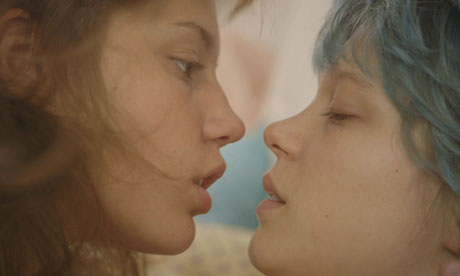The story of a passionate lesbian romance, Julie Maroh's graphic novel was published by the Belgian graphic novel press Glénat in 2010.
Blue is the Warmest Colourwon the Palme d'Or in Cannes on Sunday, Arsenal Pulp is now readying the translation for publication in September.
We appraised it and found it to be a profoundly moving coming-of-age story with beautiful artwork; at the time, we didn't know a film was involved."
We were thrilled but not entirely optimistic; after all, who doesn't want to have their film at Cannes?" said Lam. "We were amazed, then, when at the end of April we learned that the film was accepted into the official competition, only to have word-of-mouth quickly build, leading to the stunning Palme d'Or win last Sunday."
It is a graphic novel worthy of the highest praise and broad translation."
Maroh herself wrote on her website that she was "absolutely overwhelmed, amazed, and grateful" for the "wonderful and breathtaking" win in Cannes. "Last night I realised this is the first time in cinema's history that a comic book had inspired a Palme d'Or movie and this idea petrified me," she wrote. "It's a lot to carry."

When writing the graphic novel, said Maroh, she didn't set out to "make a book in order to preach to the choir, nor only for lesbians". "Since the beginning my wish was to catch the attention of those who had no clue, had the wrong picture, based on false ideas, hated me/us," she said. "I'd like that myself, those that I love, and all the others, would no longer be insulted, rejected, beaten up, raped, murdered … because of our differences. Everyone had the opportunity to interpret and identify freely with the book, but I really wanted to clarify my intention with it, once again. But it also served to tell a story of how a romantic encounter happens, how a love story builds, collapses, and what remains of the love that was awoken after a breakup, a mourning, a death. This is what [film-maker Abdellatif Kechiche] was interested in. Neither of us had a militantly activist intent."
Maroh did, however, criticise the film's explicit sex scenes, saying they brought to mind "a brutal and surgical display, exuberant and cold, of so-called lesbian sex, which turned into porn, and made me feel very ill at ease … I lost the control of my book as soon as I gave it away to be read. It's an object meant to be handled, felt, interpreted."

No comments:
Post a Comment
Note: only a member of this blog may post a comment.